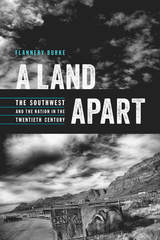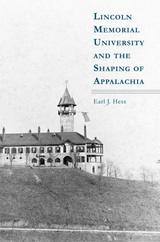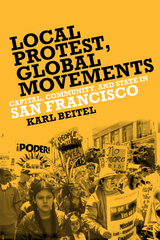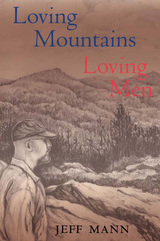10 start with L start with L

Winner, Spur Award for Best Contemporary Nonfiction (Western Writers of America)
A Land Apart is not just a cultural history of the modern Southwest—it is a complete rethinking and recentering of the key players and primary events marking the Southwest in the twentieth century. Historian Flannery Burke emphasizes how indigenous, Hispanic, and other non-white people negotiated their rightful place in the Southwest. Readers visit the region’s top tourist attractions and find out how they got there, listen to the debates of Native people as they sought to establish independence for themselves in the modern United States, and ponder the significance of the U.S.-Mexico border in a place that used to be Mexico. Burke emphasizes policy over politicians, communities over individuals, and stories over simple narratives.
Burke argues that the Southwest’s reputation as a region on the margins of the nation has caused many of its problems in the twentieth century. She proposes that, as they consider the future, Americans should view New Mexico and Arizona as close neighbors rather than distant siblings, pay attention to the region’s history as Mexican and indigenous space, bear witness to the area’s inequalities, and listen to the Southwest’s stories. Burke explains that two core parts of southwestern history are the development of the nuclear bomb and subsequent uranium mining, and she maintains that these are not merely a critical facet in the history of World War II and the militarization of the American West but central to an understanding of the region’s energy future, its environmental health, and southwesterners’ conception of home.
Burke masterfully crafts an engaging and accessible history that will interest historians and lay readers alike. It is for anyone interested in using the past to understand the present and the future of not only the region but the nation as a whole.

Half of Indonesia’s massive population still lives on farms, and for these tens of millions of people the revolutionary promise of land reform remains largely unfulfilled. The Basic Agrarian Law, enacted in the wake of the Indonesian revolution, was supposed to provide access to land and equitable returns for peasant farmers. But fifty years later, the law’s objectives of social justice have not been achieved.
Land for the People provides a comprehensive look at land conflict and agrarian reform throughout Indonesia’s recent history, from the roots of land conflicts in the prerevolutionary period and the Sukarno and Suharto regimes, to the present day, in which democratization is creating new contexts for people’s claims to the land. Drawing on studies from across Indonesia’s diverse landscape, the contributors examine some of the most significant issues and events affecting land rights, including shifts in policy from the early postrevolutionary period to the New Order; the Land Administration Project that formed the core of land policy during the late New Order period; a long-running and representative dispute over a golf course in West Java that pitted numerous local farmers against the government and local elites; Suharto’s notorious “million hectare” project that resulted in loss of access to land and resources for numerous indigenous farmers in Kalimantan; and the struggle by Bandung’s urban poor to be treated equitably in the context of commercial land development. Together, these essays provide a critical resource for understanding one of Indonesia’s most pressing and most influential issues.
Contributors: Afrizal, Dianto Bachriadi, Anton Lucas, John McCarthy, John Mansford Prior, Gustaaf Reerink, Carol Warren, and Gunawan Wiradi.

Between 2010 and 2025, most of the countries of Latin America will commemorate two centuries of independence, and Latin Americans have much to celebrate at this milestone. Most countries have enjoyed periods of sustained growth, while inequality is showing modest declines and the middle class is expanding. Dictatorships have been left behind, and all major political actors seem to have accepted the democratic process and the rule of law. Latin Americans have entered the digital world, routinely using the Internet and social media.
These new realities in Latin America call for a new introduction to its history and culture, which Latin America at 200 amply provides. Taking a reader-friendly approach that focuses on the big picture and uses concrete examples, Phillip Berryman highlights what Latin Americans are doing to overcome extreme poverty and underdevelopment. He starts with issues facing cities, then considers agriculture and farming, business, the environment, inequality and class, race and ethnicity, gender, and religion. His survey of Latin American history leads into current issues in economics, politics and governance, and globalization. Berryman also acknowledges the ongoing challenges facing Latin Americans, especially crime and corruption, and the efforts being made to combat them. Based on decades of experience, research, and travel, as well as recent studies from the World Bank and other agencies, Latin America at 200 will be essential both as a classroom text and as an introduction for general readers.

Located near Cumberland Gap in the rugged hills of East Tennessee, Lincoln Memorial University (LMU) was founded in 1897 to help disadvantaged Appalachian youth and reward the descendents of Union loyalists in the region. Its founder was former Union General Oliver Otis Howard, a personal friend of Abraham Lincoln, who made it his mission to sustain an institution of higher learning in the mountain South that would honor the memory of the Civil War president.
In Lincoln Memorial University and the Shaping of Appalachia, LMU Professor Earl J. Hess presents a highly readable and compelling history of the school. Yet the book is much more than a chronology of past events. The author uses the institution’s history to look at wider issues in Appalachian scholarship, including race and the modernization of educational methods in Appalachia. LMU offered a work-learn program to help students pay their way, imparting the value of self-help, and it was hit by a massive student strike that nearly wrecked the institution in 1930. LMU has played an important role in shaping what higher learning could be for young people in its region of southern Appalachia.
The volume examines the involvement of O. O. Howard and his unflagging efforts to establish and fund the school; the influence of early twentieth-century industrial capitalism—
Andrew Carnegie and John D. Rockefeller were benefactors—on Appalachia and LMU in particular; and the turn-of-the-century cult of Lincoln that made the university a major repository of Lincolniana.
Meticulously researched and richly illustrated, Lincoln Memorial University and the Shaping of Appalachia is a fresh look at the creation, contributions, and enduring legacies of LMU. Students, alumni, and friends of the university, as well as scholars of Appalachian culture and East Tennessee history, will find this book both enlightening and entertaining.
Earl J. Hess holds the Stewart W. McClelland Chair in History at Lincoln Memorial University. He is the author of more than a dozen books on Civil War military history, the latest of which is Into the Crater: The Mine Attack at Petersburg.

Throughout the pages of this highly original and meticulously researched book, we follow the rich and fascinating history of Lisbon—European capital city and cosmopolitan metropolis—from its legendary founding by Ulysses to the present day, covering the most remarkable moments of the city, such as the conquest of Lisbon, the period of discoveries, the great earthquake of 1755, the departure of the royal court for Brazil, the Liberal revolts, the Estado Novo, Carnation Revolution, and Expo '98. Abounding with episodes that shaped the history of this vibrant port city, accounts of everyday life, and tales about traditional neighborhoods and the innumerable streets where we can still discover traces of the past, this amply illustrated and engaging book makes the seductively enchanting city of Lisbon come to life.

Latin America’s widespread poverty and multi-dimensioned inequalities have long perplexed and provoked observers. Until recently, economic historians could not contribute much to the discussion of living standards and inequality, because quantitative evidence for earlier eras was lacking. Since the 1990s, historians, economists, and other social scientists have sought to document and analyze the historical roots of Latin America’s relatively high inequality and persistent poverty.
This edited volume with eight compelling chapters by preeminent economists and social scientists brings together some of the most important results of this work: scholarly efforts to measure and explain changes in Latin American living standards as far back as the colonial era. The recent work has focused on physical welfare, often referred to as “biological” well-being. Much of it uses novel measures, such as data on the heights or stature of children and adults (a measure of net nutrition) and the Human Development Index (HDI). Other work brings to the discussion new and more reliable measurements that can be used for comparing countries, often with unexpected and startling results.


Using San Francisco as an illuminating case study, Beitel analyzes the innovative ways urban social movements have organized around issues regarding land use, housing, urban ecology, and health care on the local level to understand the changing nature of protest formation around the world.
Reconciling the passing of New Left Ideals and the emergence of mobilization on a global scale, he assesses the limits of contemporary urban movements as conduits for advancing a radical political program. Beitel argues these limits reflect recurrent problems of internal fragmentation, and the manner in which liberal democratic institutions structure processes of political participation and interest representation.

As the first intellectual history of Song, Yuan, and Ming China written from a local perspective, Localizing Learning shows how literati learning in Wuzhou came to encompass examination studies, Neo-Confucian moral philosophy, historical and Classical scholarship, encyclopedic learnedness, and literary writing, and traces how debates over the relative value of moral cultivation, cultural accomplishment, and political service unfolded locally.
The book is set in one locality, Wuzhou (later Jinhua), a prefecture in China’s Zhejiang province, from the twelfth through the sixteenth century. Its main actors are literati of the Song, Yuan, and Ming, who created a local tradition of learning as a means of cementing their common identity and their claim to moral, political, and cultural leadership. Close readings of philosophical and literary texts with quantitative analysis of social and kinship networks consider why and how the local literati enterprise was built.
By treating learning as the subject, it broadens our perspective, going beyond a history of ideas to investigate the social practices and networks of kinship and collegiality with which literati defined themselves in local, regional, and national contexts.

READERS
Browse our collection.
PUBLISHERS
See BiblioVault's publisher services.
STUDENT SERVICES
Files for college accessibility offices.
UChicago Accessibility Resources
home | accessibility | search | about | contact us
BiblioVault ® 2001 - 2024
The University of Chicago Press









